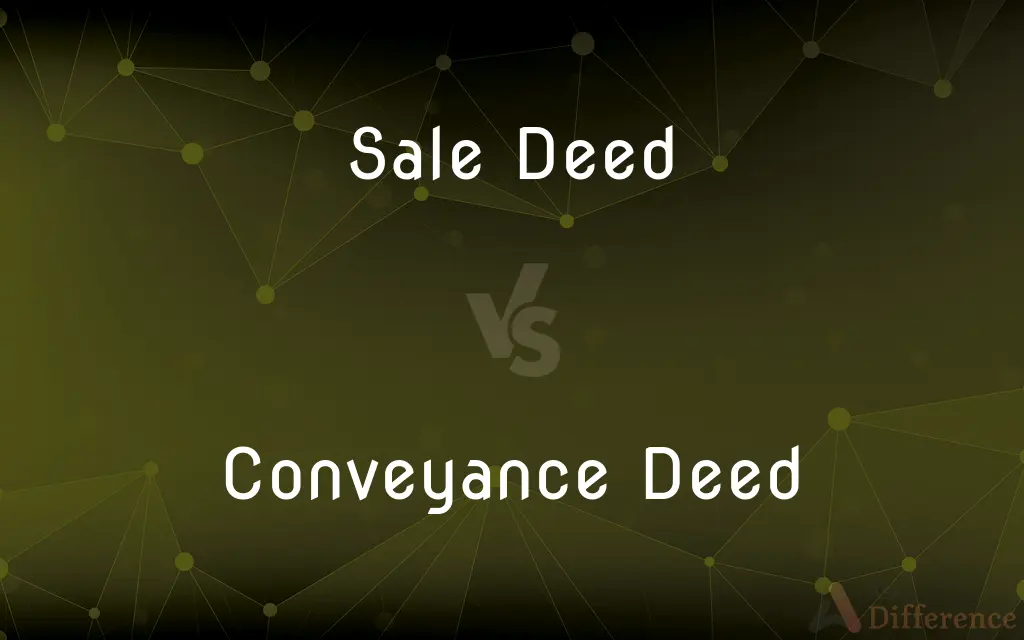Sale Deed vs. Conveyance Deed — What's the Difference?
By Fiza Rafique & Maham Liaqat — Published on September 13, 2024
Sale Deed is a document proving sale and transfer of property ownership, while Conveyance Deed includes a broader range of property transfers.

Difference Between Sale Deed and Conveyance Deed
Table of Contents
ADVERTISEMENT
Key Differences
A Sale Deed is specifically used in the context of buying and selling property, acting as legal evidence that the sale has occurred and ownership has transferred from the seller to the buyer. It is executed at the time of property delivery, detailing the transaction between two specific parties. On the other hand, a Conveyance Deed is a broader term that encompasses any legal document that facilitates the transfer of property ownership from one party to another, which can include a Sale Deed, gift deed, exchange deed, etc.
While a Sale Deed is finalized upon the completion of a sale transaction, indicating that the buyer has paid the agreed-upon price and the seller has transferred the property, a Conveyance Deed can be used to transfer property as a gift, in exchange for other property, or through other means not involving a sale. This makes the Sale Deed a subset of Conveyance Deed, focused specifically on sales transactions.
The Sale Deed requires specific details about the transaction, including the price paid for the property, the parties involved, and the property's exact location and dimensions. Conversely, the content of a Conveyance Deed varies based on the type of property transfer it is facilitating, but it generally includes information about the grantor (the person transferring the property), the grantee (the recipient of the property), and the property itself.
Another key difference lies in the legal implications of each document. The Sale Deed explicitly states that the transaction is a sale, involving the exchange of property for a monetary value, which can have specific tax implications for both the buyer and the seller. In contrast, the legal implications of a Conveyance Deed depend on the nature of the transfer (e.g., a gift might have different tax consequences from a sale).
Despite these differences, both the Sale Deed and the Conveyance Deed are crucial in the legal process of transferring property. They both need to be legally registered to be effective, ensuring that the transfer is recognized by law and that the new ownership is officially recorded.
ADVERTISEMENT
Comparison Chart
Purpose
Proves the sale and transfer of ownership for property.
Facilitates any legal transfer of property ownership.
Scope
Limited to transactions involving sale.
Includes sale, gift, exchange, and more.
Details Required
Details of the sale transaction, including price, parties, and property specifics.
Details vary based on the transfer type but generally include information about the grantor, grantee, and property.
Legal Implications
Specifies a sale involving monetary exchange, affecting taxes and duties.
Varies depending on the nature of the property transfer (e.g., sale, gift, etc.).
Registration
Must be registered to be legally valid.
Must also be registered to effect the transfer of ownership legally.
Compare with Definitions
Sale Deed
A record of the transaction including price, parties involved, and property details.
The Sale Deed explicitly stated the sale price and property boundaries.
Conveyance Deed
A legal document that encompasses any form of property ownership transfer.
The Conveyance Deed was prepared to transfer the property as a gift.
Sale Deed
A legal document that signifies the sale of a property from one person to another.
The Sale Deed was signed, marking the completion of the property sale.
Conveyance Deed
A broader category of legal documents for property transfer.
The lawyer recommended updating the Conveyance Deed to reflect the new ownership.
Sale Deed
Essential for the legal transfer of property ownership through sale.
Registering the Sale Deed legally changed the property's ownership.
Conveyance Deed
Legally records the transfer of property from one party to another.
The Conveyance Deed registration confirmed the property's new owner.
Sale Deed
Formal evidence of a property sale transaction.
The bank requested a copy of the Sale Deed for the mortgage application.
Conveyance Deed
Includes various forms of property transfers beyond sale.
Their Conveyance Deed documented the exchange of lands between two parties.
Sale Deed
A binding agreement that ensures the seller transfers property rights to the buyer.
The Sale Deed included clauses on the property's condition at sale time.
Conveyance Deed
Specifies details relevant to the nature of the property transfer.
The Conveyance Deed for the gifted property mentioned no monetary exchange.
Common Curiosities
What is a Sale Deed?
A Sale Deed is a legal document that records the sale of property from one party to another, detailing the transaction specifics, including the sale price and property details, and serves as proof of ownership transfer.
Can a Sale Deed be used for property gifts?
No, a Sale Deed is specifically used for sales transactions involving a monetary exchange for property. For gifts, a Gift Deed, another type of Conveyance Deed, would be used.
How does a Sale Deed differ from a Conveyance Deed?
A Sale Deed is specific to transactions that involve the sale of property, detailing the sale terms and parties involved. A Conveyance Deed is a broader term that includes the Sale Deed but also covers other forms of property transfers like gifts or exchanges.
Is a Conveyance Deed necessary if I have a Sale Deed?
The Sale Deed is a type of Conveyance Deed, specifically used for sales. Therefore, if the property transfer is a sale, the Sale Deed itself acts as the Conveyance Deed.
What information is included in a Conveyance Deed?
A Conveyance Deed includes details about the grantor and grantee, the property being transferred, and the terms of the transfer, which vary depending on the transfer type (e.g., sale, gift, exchange).
What constitutes a valid Sale Deed?
A valid Sale Deed must be legally drafted, include comprehensive details of the transaction (parties involved, property description, payment details), and be registered with the appropriate government authority to be legally binding.
Why is registration of a Conveyance Deed important?
Registration of a Conveyance Deed is crucial as it legally solidifies the transfer of property, ensures public recording, and protects the rights of the grantee against third-party claims.
What are the legal implications of not registering a Sale or Conveyance Deed?
Not registering a Sale or Conveyance Deed can lead to the transfer being legally unrecognized, potentially resulting in disputes over property ownership and rights.
Do all property transfers require a Conveyance Deed?
Yes, any legal transfer of property ownership should be documented with a Conveyance Deed to ensure the transfer is recognized and effective under law.
How does a Sale Deed affect property taxes?
The execution of a Sale Deed typically results in the reassessment of the property for tax purposes, potentially altering the property tax liabilities based on the sale price and current tax laws.
What is the difference between a Sale Deed and a Sale Agreement?
A Sale Agreement outlines the terms and conditions under which the property will be sold and transferred, acting as a precursor to the Sale Deed, which is the actual document that effects the transfer of ownership.
What role does a lawyer play in drafting a Sale or Conveyance Deed?
A lawyer ensures that the Sale or Conveyance Deed complies with legal standards, accurately reflects the transaction terms, protects the client's interests, and is properly registered, providing legal validity to the property transfer.
Can a Conveyance Deed be revoked?
A Conveyance Deed, once executed and registered, generally cannot be revoked unless it was executed under duress, fraud, or misrepresentation, or if a clause in the deed allows for revocation under certain conditions.
Is a witness necessary for a Conveyance Deed?
Yes, witnesses are required when executing a Conveyance Deed to ensure its validity and authenticity, with the specific number and qualifications of witnesses varying by jurisdiction.
How do I correct errors in a Sale or Conveyance Deed?
Corrections in a Sale or Conveyance Deed usually require the execution of a supplementary deed, known as a rectification deed, agreed upon by all parties involved and registered with the appropriate authority.
Share Your Discovery

Previous Comparison
1 Propanol vs. 2 Propanol
Next Comparison
Condo vs. DuplexAuthor Spotlight
Written by
Fiza RafiqueFiza Rafique is a skilled content writer at AskDifference.com, where she meticulously refines and enhances written pieces. Drawing from her vast editorial expertise, Fiza ensures clarity, accuracy, and precision in every article. Passionate about language, she continually seeks to elevate the quality of content for readers worldwide.
Co-written by
Maham Liaqat












































